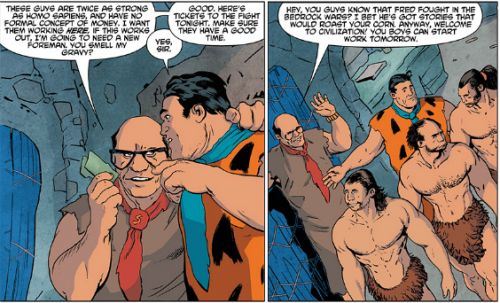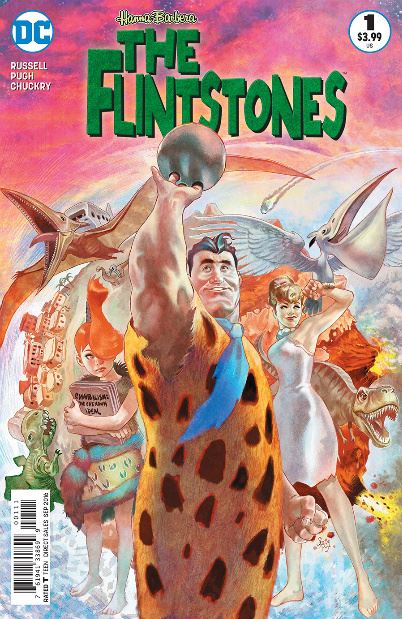Review: The Flintstones #1
By Zak Edwards
July 6, 2016 - 16:51
DC Comics
Writer(s): Mark Russell
Penciller(s): Steve Pugh
Colourist(s): Chris Chuckry
Letterer(s): Dave Sharpe
Cover Artist(s): Steve Pugh
 |
| Mr. Slate, being exploitive. Fred Flinstone, being complacent. |
The story’s main plot follows Fred trying to get on Mr. Slate’s good side by schmoozing some neanderthals who’ll work for literal gravel. What follows is a strange journey into the heart of a post-war Bedrock, including a war vets meeting with gruesome recollections of life on the front lines, a boxing match in which the loser is picked apart by giant pterodactyls, and a theme restaurant dinner that ends with neanderthals mourning the deflation of a pig-shaped balloon.
While the entire run around Bedrock may have fallen flat for me, it clearly struck a cord for our thinly-veiled foreign worker metaphors. They spend the next day working at the quarry and celebrate that evening at Mr. Slate’s mansion, where one is eventually killed by a roaming mastodon. That seemed to be the last straw and the workers leave, citing that the "whole point of society seems to be "to get someone else to do your killing for you.” Slate is pissed off that he’s going to have to pay livable wages. Fred is disappointed that he’s gotten nowhere and that “it seems no one really controls their own fate.” For a comic reboot of a sixties sitcom, it's sure obsessed with death.
Bleeding Cool rightfully picked up on the Mad Men feel of the series but neglected to point out that what makes Mad Men great, and this comic not, is purposeful substance. Nothing captures this issue better than the "shell phone."
 |
| The Flintstones #1 cover art by Steve Pugh. |
The shell phone, awkward and purposeless, is essentially a boiled-down version of what’s wrong with the issue. Everything from the collective post-war PTSD to the murdered neanderthals gives off the appearance of substance, but in doing so, it only rings hollow and alienates. For a series that’s supposedly about modern life, its backwards homage to its origins feels stiff, surreal, and ultimately disappointing. And there isn’t even a laugh to be had throughout, although there are some genuine attempts. And while drama can do an amazing job of social commentary, so can comedy. Here, a nostalgia for period dramas wins over crisp satire.
Russell’s entire revamp is complemented by Steve Pugh’s art, which sticks closely to DC’s house style over any homage to the original art of the show. Granted, the new script would feel very strange coming from the mouths of the classic Hanna-Barbera style. Like the script, the characters are joyless, spruced up by Chris Chuckry’s colours that make the animals and the clothes pop while the rest remains a palette of complicated beige. Even the hyper-detailed Bedrock, which pops off of every page, can't seem to detract from the dirt that accumulates throughout.
I’m not going to pretend that The Flintstones was some sort of hyper-progressive show. It’s based on The Honeymooners, a show that turned domestic abuse into catchphrase comedy, but it was a quirky sitcom that used modern sensibilities for laughs. Fred, for all his stubbornness, would get his comeuppance in almost every circumstance. Here, a thinly-veiled Mexican worker is killed and Fred’s pissed that he doesn’t get a small raise. The Mad Men comparison may be even more apt. If the original series is Dick Whitman, this comic is most certainly Don Draper: a callous, overt attempt to create a new persona that's ultimately hollow. Too bad Bedrock doesn't have any Coke. Mind you, if they did, it'd be a drug and Barnie would be addicted to it.
tl;dr review: A bold reboot of The Flintstones that’s more war, death, and worker exploitation than laughs. A real yabba-dabba-don’t (sorry, couldn’t resist).
Related Articles:
The Flintstones #12
The Flintstones #10
Booster Gold and the Flintstones #1
The Flintstones #9
The Flintstones #8
The Flintstones #7
The Flintstones #6
The Flintstones #5
The Flintstones #4 comics review
Review: The Flintstones #1
